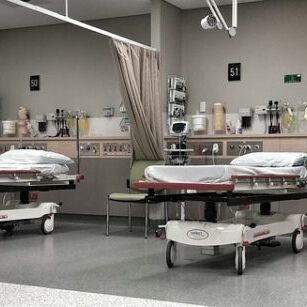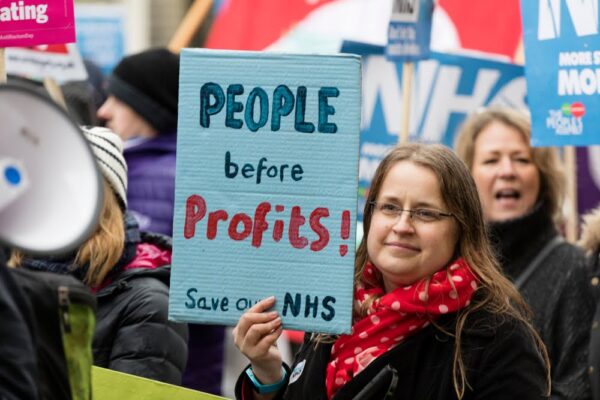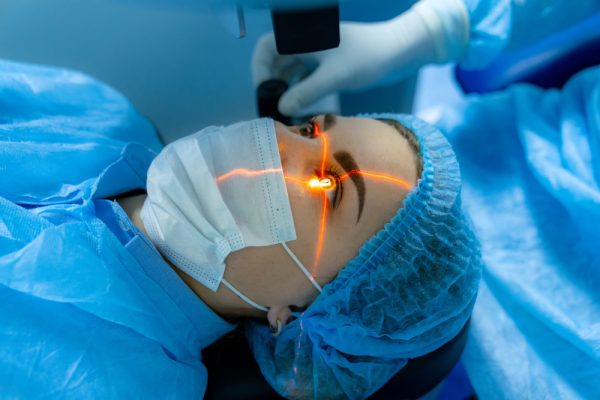The NHS has had contracts with private hospitals to carry out elective surgery for many years and patients were able to choose a private hospital under the choose-and-book system.
Successive Conservative governments from 2010 refused to fund increasing NHS capacity at a sufficient level to have any impact on the waiting list, so hospital trusts and other commissioning bodies turned to contracts with the private sector. The result is that the number of NHS patients being treated in private hospitals has increased significantly since 2010.
The Independent Healthcare Providers Network (IHPN) analyses the figures for spend on non-NHS providers on elective work as they are released by NHS England, with the most recent figures reported in January 2025.
In recent years, the share of activity carried out by the non-NHS sector has risen. In terms of activity share, the independent sector is now consistently delivering 10% of all NHS elective care, up from around 8% pre-pandemic. This proportion is higher still in the case of admitted elective activity, with the IS treating almost 1 in 5 admitted elective patients overall in 2024.
Multiple concerns in DHSC briefing on private eye clinics and the NHS
There have been concerns for several years on the effect the private companies have been having on ophthalmology in the NHS and on the quality of work carried out by the private companies (see Hospitals sector).
In April 2025, The Sunday Times reported on a leaked briefing from the DHSC about the private eye clinic market and its business with the NHS. The briefing, which was given to Wes Streeting in November 2024, detailed concerns about the effect the five main companies, SpaMedica, CHEC, Newmedica, Optegra and ACES, outlined how money and expertise was being drained from the NHS.
The briefing said: “The delivery of high-volume low-complexity cataracts procedures in the independent sector has rapidly expanded since 2019. NHS England has concerns covering value for money, unnecessary operations, impacts on workforce and training, poor follow-ups and patient safety.”
As warned about for several years, the report noted that NHS hospital trusts were becoming short of consultants; it found that 76% of departments did not have enough consultants to provide a full service, meaning patients with serious conditions that left untreated can lead to blindness, such as glaucoma or wet macular degeneration, were waiting longer to be seen. This situation is outlined in more detail below under Diversion of money, staff and training opportunities.
The Sunday Times article focused on financial issues noting that there were “serious concerns among NHS England officials about some clinics’ financial practices, poor post-surgery care and patient safety.” The article noted that private clinics now face investigation over claims they have “artificially inflated costs for the taxpayer, performed unnecessary operations and incentivised high-street optometrists to refer patients to their services.”
The DHSC said it was investigating and the NHS Counter Fraud Authority has been called in to examine billing irregularities in the private cataract market.
One aspect highlighted by the article was the practice whereby in exchange for patients being referred for surgery, some providers guarantee a follow-up appointment with a high-street optometrist paid for by the NHS, despite the fact that the rules state that companies should not offer fees as inducements for referrals. In addition, the DHSC briefing said most patients did not need these follow-up appointments. The CHPI (Centre for Health and the Public Interest) found that in the year to 2023, the NHS paid for 235,000 such appointments, costing almost £16 million.
Another issue is that although companies had agreed to manage all their post-surgery complications, “NHS A&E units are still reporting patients attending A&E for post-operative complications following [private] cataract surgery”.
There are concerns over the quality of work carried out by the companies, with reports that some companies are using poorer-quality lenses than those used in the NHS. The briefing said: “This suggests that the independent sector has not delivered good value for money in ophthalmology.”
This market has massively expanded over the past decade. Cataract surgery is straightforward and takes an average of 15 minutes per eye to carry out. A clinic can perform up to 16 in a four hour session. With NHS cataract operations costing between £896 and £2,653, the business has proved to be very lucrative for the companies.
A separate financial analysis by the Centre for Health and the Public Interest (CHPI), published in April 2025 found the five major companies were paid a total of £536 million to carry out NHS cataract surgery in 2023-24, delivering a profit of £169 million.
David Rowland, CHPI director, told the paper that: “The weak market regulations governing the NHS have allowed private companies to gain access to huge amounts of taxpayer revenues and local NHS commissioners have been powerless to stop them.”
Although normally the NHS assesses its population in a particular area and determines a contract for that population, in the case of ophthalmology contracts, once a company has a contract with at least one local NHS area, it can operate anywhere in England and submit a bill to the NHS for payment even in areas where it has no agreement. The CHPI found over a three-year period at the least 84,000 cataract procedures had been paid for by the NHS without any contract in place. As a result the NHS can not control the number of patients. The CHPI estimates that cataract activity should have grown by about 3.5% each year, but instead it rose 47% between 2019-20 and 2023-24, with the costs for the NHS increasing 100% from £439 million to £880 million.
The focus of the NHS Counter Fraud Authority specialist team is the practice of “upcoding”. This is where the complexity of a patient’s treatment, which is given specific codes under an NHS payment tariff, is set at a higher level meaning companies are paid more. The CHPI said there had been a 144% rise in complex surgery in the past five years among private providers.
SpaMedica, the largest private eye clinic company, was singled out by the DHSC briefing for criticism. It was alleged that the company, which had carried out more than a quarter of all cataract operations, coded the majority of its patients “at higher complexity, resulting in the cost per procedure being 8% more expensive than [at] an NHS hospital”. SpaMedica has denied any wrongdoing.
An NHS England source said the problems had been building for years but no significant action had been taken. They added: “Massive holes have been allowed to exist and no attempt has been made to close them. The companies have just taken advantage of an overly complex system built around too much trust.”
The amount a company can claim for a complex procedure was reduced in March 2024 by NHS England following what it said was significant growth in cataract surgery that was not linked to an increase in demographics or waiting lists.
Elective Surgery and Patient Safety
The safety of the private sector has been a concern for many years, with questions over their lack of ICU beds, use of registered medical officers, lack of transparency, communication issues with the NHS, and even the use of individual rooms. The issue of NHS patient safety has been investigated by the Centre for Health and the Public Interest (CHPI).
The concerns include:
- Post-operative care in private hospitals is usually carried out by inexperienced junior doctors who are working excessively long hours.
- The consultant who carries out the surgery and who is responsible for the patient is permitted to be off-site.
- Nature of this post-operative care has been cited as a factor in a number of patient deaths.
- Lack of intensive care facilities means if something goes wrong then patients have to be transferred back to NHS hospitals, which in itself is very dangerous.
- Data on patient safety in private hospitals is poor and they aren’t required to make this information public in the same way as NHS hospitals are.
With the number of patients being treated in these hospitals increasing, particularly with the Choose and Book system or with acute trusts referring patients to clear extensive waiting lists, it is important to note these issues.
CHPI conclude that NHS commissioners and clinicians would find it difficult to avoid blame, and possible legal consequences, if NHS patients are harmed in private hospitals. Particularly now that the risks are openly documented.
This raises the issue of the cost of these referrals, both in the short term and the long term. In the short term, the cost of treatment for NHS patients in private hospitals is much higher than it would be if they could be treated in NHS facilities. Moreover, if something is to go wrong and there are legal consequences then it is the NHS that may have to pick up the bill in the long term.
In another report, the CHPI also document the safety issues in private hospitals following the scandal whereby surgeon Ian Paterson wounded 500 women who underwent unnecessary breast surgery in private hospitals. They conclude that until the private hospitals have full liability for the patients under their care, then there will be no guarantee of safety.
The Paterson scandal led to a public inquiry that released a damning report in February 2020 stating that the private healthcare system he worked in was “dysfunctional at almost every level”. However, the government has yet to make the major changes in the report that would have improved patient safety in private hospitals. In November 2021, the safety of the independent hospital sector was once again under the spotlight in a report released by the HSIB (Healthcare Safety Investigation Branch) – Surgical Care in Independent Hospitals – triggered by the death of a NHS patient sent to an independent hospital for bowel surgery. The report made six safety recommendations, three to NHS England and NHS Improvement, one to NHSX, and two to the Care Quality Commission (CQC).
Covid-19 pandemic and private hospitals
The Covid-19 pandemic gave the private hospital sector major opportunities to work for the NHS. In March 2020 the government agreed a contract to block-book the entire capacity of all 7,956 beds in England’s 187 private hospitals along with their almost 20,000 staff. It is reported to have cost around £400m a month. The plan was for the private hospitals to treat covid-19 patients as well as providing Covid-19 free hospitals to carry out NHS elective surgery and cancer treatment, as the NHS hospitals began filling with Covid-19 patients.
However, in October 2021 the Centre for Health and the Public Interest reported that on 39% of days between March 2020 and March 2021, private hospitals treated no Covid patients at all and on a further 20% of days they cared for only one person. Overall, they provided only 3,000 of the 3.6m Covid bed days in those 13 months – just 0.08% of the total.
Prior to the pandemic, private hospitals undertook 3.6m NHS-funded planned procedures in 2019, that dropped to only 2m during the first year of the pandemic – a fall of 43%. The House of Commons public accounts committee, was shown two letters to the wider NHS explaining why the deal had been struck and what it would cover, which make it clear that it would include care for Covid patients with serious breathing problems as well as routine operations, such as hip and knee replacements. However, The Independent Healthcare Providers Network, which negotiated the deal on behalf of private hospitals, insisted that it was never intended to cover people with Covid.
Chair of the Public Accounts Committee, Labour MP Meg Hillier, said the findings showed the government and NHS had got poor value for money from the very expensive deal.
“Taxpayers have covered an entire year of private hospitals’ costs in return for less treatment and care than before, and many of them now feel forced to pay those same private hospitals over again in the face of an NHS beset with lengthy backlogs.”
Failure of management at Hinchingbrooke hospital
The most well-known contract failure in hospital services is that of Hinchingbrooke Hospital and the contract for its management with Circle. The ten year contract was awarded to Circle in 2013, but just two years later in January 2015, Circle pulled out of the contract. The company announcement came just before the publication of a damning report on the hospital from the Care Quality Commission (CQC): the CQC raised serious concerns about care quality, management and culture at the hospital.
The CQC found a catalogue of serious failings at the hospital that put patients in danger and delayed pain relief. The hospital was put in to special measures, the first time the CQC had had to do this. Circle cited financial reasons for pulling out: under the contract the company was allowed to withdraw if it had to invest more than £5 million of its own money in the hospital and it looked extremely likely that it was going to have to invest much more than £5 million.
Serco and Braintree hospital
In another example, in December 2013 Serco announced that it would be pulling out of its contract for running Braintree hospital in Essex before the end of the contract. In March 2014 the contract was handed back to the Mid Essex Hospital Trust nearly a year early. The company’s other major contract with the NHS for community care in Suffolk has not reaped the profits the company was hoping for and by August 2014, the company announced that it was withdrawing from the NHS clinical services market altogether. In September 2015, when Serco handed over the community care contract in Suffolk to new providers, the company noted that the £140 million the company was paid for the contract was “not adequate” for the work. Serco estimates that it had made an £18 million loss on its three NHS contracts.









